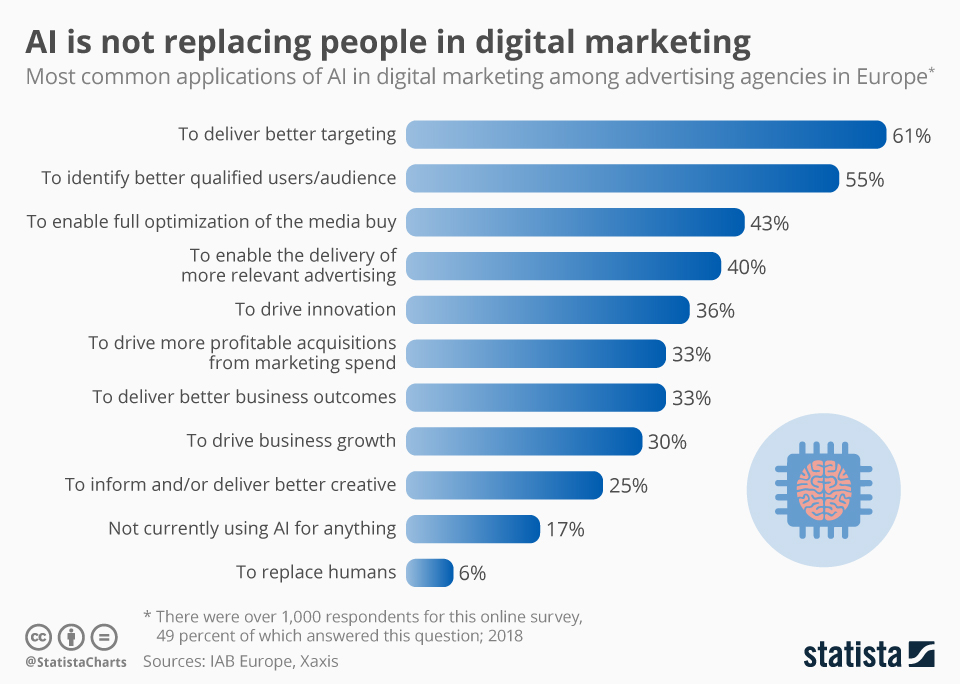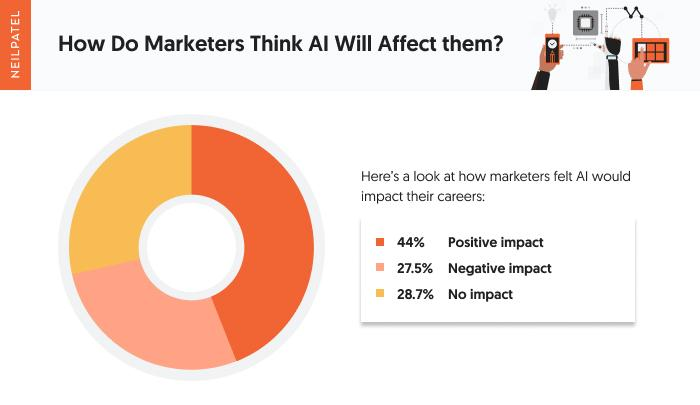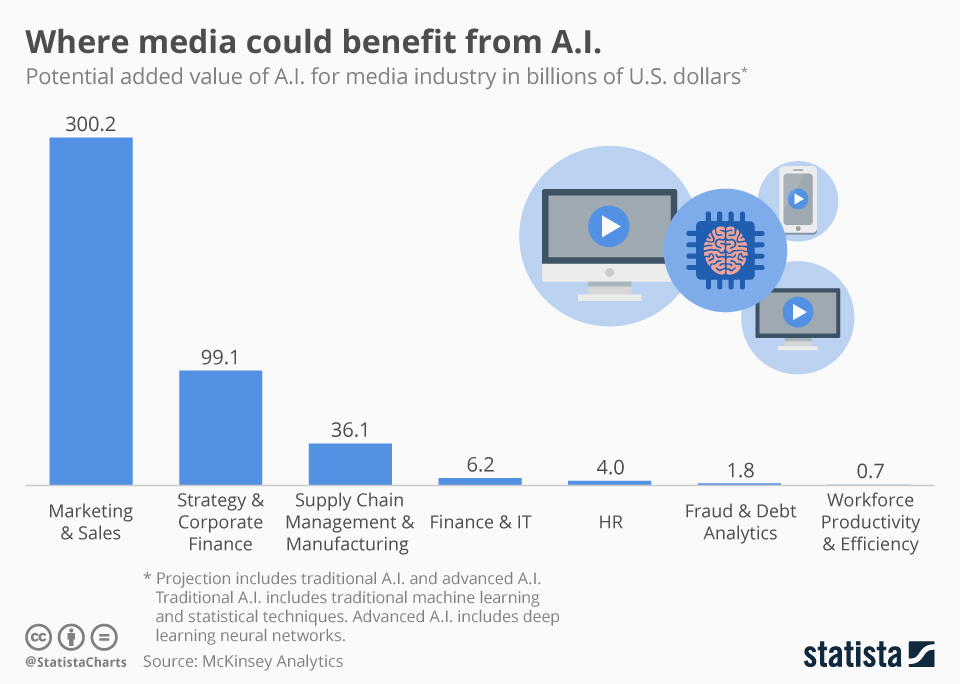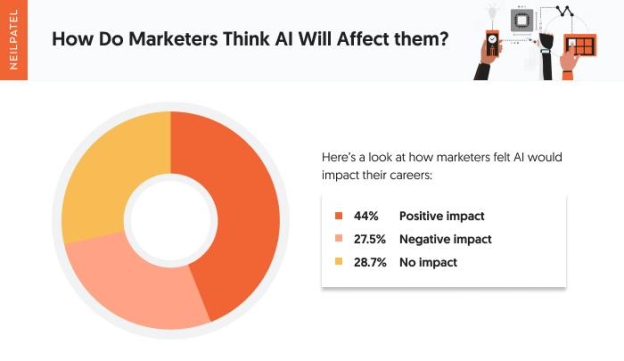So you may have heard the buzz about the potential of artificial intelligence (AI) and its impact on various industries. But have you ever wondered if AI could actually replace social media marketing? We’re all familiar with how social media platforms have revolutionized the way businesses engage with their audiences. However, as AI continues to advance by leaps and bounds, its capabilities are becoming increasingly sophisticated. In this article, we’ll explore whether AI has the potential to take over the reins of social media marketing and what that could mean for businesses and marketers like you.

This image is property of cdn.statcdn.com.
The Role of AI in Social Media Marketing
Introduction to AI in social media marketing
Artificial Intelligence (AI) has emerged as a powerful tool in various industries, and social media marketing is no exception. AI technologies have the ability to revolutionize the way businesses engage with their target audience, analyze data, and optimize their marketing strategies. From improved targeting and personalization to automated customer service and data analysis, AI offers numerous benefits for social media marketing.
Benefits of using AI in social media marketing
Improved targeting and personalization
AI algorithms have the capability to analyze vast amounts of data about users’ online behavior, interests, demographics, and preferences. By leveraging this information, businesses can better target their social media ads and deliver personalized content to individual users. This not only enhances the user experience but also increases the effectiveness of marketing efforts by reaching the right audience with relevant content.
Efficient content creation and curation
Creating engaging and relevant content is a crucial aspect of social media marketing. AI-powered tools can help businesses automate content creation processes by generating compelling text, images, and videos based on predetermined parameters. Additionally, AI can also assist in content curation by analyzing user-generated content and identifying the most relevant and high-quality posts to share with followers.
Automated customer service and chatbots
Social media platforms have become an important channel for customer support. With AI-driven chatbots, businesses can automate responses to commonly asked questions, provide instant support, and handle customer inquiries more efficiently. Chatbots can also gather customer data and provide personalized recommendations, further enhancing the customer experience and fostering brand loyalty.
Enhanced data analysis and insights
One of the biggest advantages of AI in social media marketing is its ability to analyze large volumes of data in real-time. AI algorithms can identify patterns, trends, and insights from social media interactions, allowing businesses to make data-driven marketing decisions. By understanding customer behavior, sentiment analysis, and social media trends, businesses can optimize their strategies and achieve higher conversion rates.
Challenges of implementing AI in social media marketing
While AI brings significant benefits to social media marketing, there are some challenges that businesses may encounter when implementing AI technologies.
Ethical concerns and privacy issues
When leveraging AI in social media marketing, businesses must be cautious about privacy and data protection. Collecting and analyzing large amounts of user data raises concerns about privacy invasion and potential misuse of personal information. It is vital for businesses to ensure that they comply with legal and ethical guidelines, obtain proper consent, and prioritize data security and privacy when implementing AI solutions.
Over-reliance on algorithms
While AI algorithms are powerful tools for analyzing data and making predictions, there is always a risk of over-reliance on automation. Businesses must strike a balance between utilizing AI technologies and maintaining human judgment and creativity. Over-reliance on algorithms can lead to a loss of the human touch, potentially alienating customers who value personalized and genuine interactions.
Lack of human touch and emotional intelligence
AI technologies are yet to fully match human capabilities when it comes to understanding emotions, empathy, and the nuances of human communication. Social media marketing often involves building relationships, creating emotional connections, and addressing customer concerns with empathy. While AI-powered chatbots can handle basic inquiries, complex issues often require a human touch to provide satisfactory resolutions and maintain customer satisfaction.
Cost and complexity of AI implementation
Implementing AI technologies in social media marketing can be costly and complex. Building AI-powered systems, training models, and integrating them into existing marketing workflows require significant investment in terms of time, resources, and expertise. Small businesses or those with limited budgets may find it challenging to fully harness the benefits of AI in social media marketing due to the associated costs and complexities.
The Role of Social Media Marketing
Introduction to social media marketing
Social media marketing refers to the practice of utilizing social media platforms to promote products, services, and brands. With billions of active users worldwide, social media platforms offer an unprecedented opportunity for businesses to connect with their target audience, build brand awareness, engage with customers, and drive sales.
Importance of social media in modern marketing
In today’s digital landscape, social media has become an integral part of marketing strategies. It provides a platform for businesses to reach a wider audience, build brand reputation, and cultivate customer relationships. Social media marketing allows businesses to directly interact with customers, collect feedback, and address concerns, fostering a sense of trust and loyalty. Moreover, social media platforms offer extensive targeting capabilities, enabling businesses to reach specific demographics, interests, and behaviors with tailored marketing campaigns.
Key objectives of social media marketing
The primary objectives of social media marketing can vary depending on the specific goals of a business. However, some common objectives include:
-
Increasing brand awareness: Social media platforms provide an effective channel to amplify brand visibility and reach. By consistently posting engaging content, businesses can build brand recognition and increase their online presence.
-
Driving website traffic: Social media marketing can be utilized to direct traffic to a business’s website, leading to increased conversions and sales. By strategically placing links and CTAs in social media posts, businesses can encourage users to visit their website and explore their offerings.
-
Engaging with the target audience: Social media platforms allow businesses to engage in two-way conversations with their audience. Responding to comments, addressing concerns, and initiating discussions create a sense of community and improve customer satisfaction.
-
Generating leads and sales: Social media marketing can be leveraged to attract potential customers and convert them into leads and sales. By utilizing targeted ads, CTAs, and lead generation forms, businesses can capture user information and nurture prospects through the sales funnel.
-
Gathering customer insights: Social media platforms provide access to a wealth of customer data and insights. By monitoring social media conversations, analyzing engagement metrics, and conducting surveys, businesses can gain valuable insights that inform their marketing strategies and improve overall performance.

This image is property of neilpatel.com.
The Synergy between AI and Social Media Marketing
Complimenting each other’s strengths
AI and social media marketing are not mutually exclusive, but rather, they have the potential to work in synergy. While social media marketing allows businesses to reach their target audience, engage with customers, and build brand awareness, AI technologies enhance these efforts by providing advanced data analysis, automation, and personalization.
AI’s ability to enhance social media marketing efforts
AI technologies can significantly enhance social media marketing efforts in various ways:
-
Advanced data analysis: AI algorithms can analyze large volumes of data from social media platforms, providing valuable insights into user behavior, sentiments, preferences, and trends. This enables businesses to make data-driven decisions, optimize campaigns, and improve overall marketing performance.
-
Personalization and targeting: AI-powered tools can create personalized experiences for users by tailoring content, recommendations, and advertisements based on individual preferences and behaviors. This enhances user engagement and improves conversion rates.
-
Automation and efficiency: By automating certain tasks, such as content creation, posting schedules, and customer support, businesses can optimize their social media marketing workflows. This saves time and frees up resources, allowing marketers to focus on more strategic aspects of their campaigns.
The role of human expertise in leveraging AI in social media marketing
While AI brings automation and efficiency to social media marketing, human expertise remains crucial for successful implementation. Humans have the ability to understand emotions, respond to complex inquiries, and creatively develop marketing strategies that resonate with the target audience. By combining AI technologies with human expertise, businesses can leverage the strengths of both to achieve optimal results.
AI vs. Social Media Marketing
Distinguishing between AI and social media marketing
AI and social media marketing are distinct concepts serving different purposes:
-
AI: Artificial Intelligence refers to the development of systems and algorithms that mimic human intelligence and behavior. AI encompasses a wide range of technologies, including machine learning, natural language processing, computer vision, and predictive analytics.
-
Social media marketing: Social media marketing focuses on utilizing social media platforms to promote products, services, and brands. It involves creating and sharing content, managing online communities, and engaging with target audiences to achieve marketing objectives.
Comparing their effectiveness in achieving marketing goals
AI and social media marketing are not mutually exclusive but rather work together to achieve marketing goals. Social media marketing provides the platform and strategy to reach and engage with the target audience, while AI enhances marketing efforts through advanced data analysis, personalization, and automation.
Identifying situations where AI can replace social media marketing, and vice versa
AI cannot fully replace social media marketing, as human creativity, emotional intelligence, and strategic decision-making are vital for effective marketing. However, AI can automate certain repetitive tasks, such as content curation, data analysis, and customer support, allowing marketers to focus on strategic initiatives. In this way, AI complements social media marketing, making it more efficient and targeted.

This image is property of www.leadseed.io.
Successful Examples of AI in Social Media Marketing
Personalized recommendations and targeted ads
Platforms like Facebook and Instagram leverage AI algorithms to provide users with personalized recommendations and targeted ads based on their interests, browsing behavior, and demographic information. This enhances the user experience and increases the effectiveness of marketing campaigns.
Chatbots for customer support
Many businesses utilize AI-powered chatbots to handle customer inquiries and provide real-time support on social media platforms. Chatbots can efficiently handle basic queries, automate responses, and provide 24/7 customer service, improving customer satisfaction and reducing response times.
Automated content scheduling and optimization
AI tools enable businesses to automate content scheduling, ensuring timely and consistent posts on social media platforms. AI algorithms can analyze user engagement data and optimize posting times, ensuring maximum visibility and reach for content.
Predictive analytics for campaign optimization
AI-powered predictive analytics allow businesses to analyze historical data, identify patterns, and predict future outcomes. This enables marketers to optimize their social media marketing campaigns by making data-driven decisions and adapting strategies based on predicted results.
The Future of AI and Social Media Marketing
Emerging trends in AI for social media marketing
As AI continues to advance, several emerging trends are shaping the future of social media marketing:
-
Real-time marketing: AI algorithms are getting faster and more efficient, enabling real-time analysis of social media data and trends. This allows businesses to deliver timely and relevant content to their audience, increasing engagement and responsiveness.
-
Voice recognition and chatbots: With the popularity of voice assistants like Siri and Alexa, the integration of voice recognition technology into social media marketing is becoming increasingly important. AI-powered chatbots are also evolving to provide more accurate and human-like interactions, further enhancing customer support.
Potential applications and advancements in AI
In the future, AI is expected to play an even more significant role in social media marketing. Advancements in AI technologies may include:
-
Improved sentiment analysis: AI algorithms can be further refined to better understand and analyze emotions expressed by users on social media platforms. This will enable businesses to tailor their messaging and responses to better align with customer sentiments.
-
Predictive content creation: AI-generated content is expected to become more refined and personalized, allowing businesses to deliver highly engaging and relevant content to their target audience.
Ethical considerations and regulation of AI in marketing
As AI progresses, it is crucial to address ethical concerns related to privacy, data security, and potential biases. Regulations and guidelines should be established to ensure responsible and ethical use of AI in social media marketing. Transparency and accountability in data collection, processing, and targeted advertising are essential to maintain trust with consumers.

This image is property of www.sociallyinfused.com.
Conclusion
AI has become an indispensable tool in social media marketing. By leveraging AI technologies, businesses can improve targeting and personalization, automate customer service, enhance data analysis, and optimize their marketing strategies. While there are challenges to implementing AI, the synergy between AI and social media marketing can drive better outcomes and ensure businesses effectively engage with their audience. As AI continues to evolve, the future of social media marketing holds enormous potential for more personalized, efficient, and data-driven marketing strategies.
